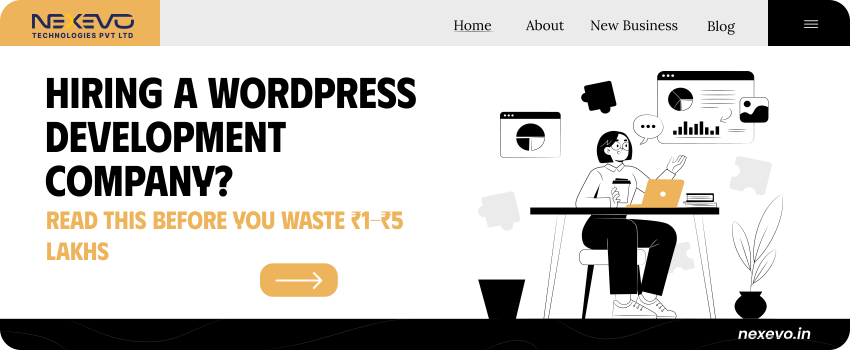How to Choose the Best Web Development Company?

Fostering trust, imparting expertise, enlightening, and converting site visitors into leads are the main objectives of small businesses websites. This task may be readily accomplished by a Web Development Company, but there are a few considerations, such as the type of content management system and the place where the site will be hosted.
Starting your first website project might be unpleasant if you don't do your homework before selecting a web development company. I've observed (or heard about) the good, the terrible, and the ugly during my time in web development. Are you looking for help setting up websites, chat rooms, and other things? Are you going to need constant upkeep or content creation? You must all ask yourself the following queries before searching for a web design company.
Effective 15 Best Tips Choose the Best Web Development Company
Due to the necessity of having an online presence for almost all businesses nowadays, the web development industry is expanding quickly. Based on their unique business procedures, each web development firm will give a certain quality at a different price and offer a varied range of services.
The front-end, or visual appeal of a website, is the focus of web design services, which have a more limited range of services. Front-end and back-end work are combined with aesthetics and usefulness in web development. There are some of the effective ways to choose a web development company:
1.Business Requirement:
A system does not have to comply with a business requirement. It is something that the company must do or possess in order to continue operating. Start by looking at how they tackle your needs.
Obtain their client list and look at the prior solutions they have provided. His or her solutions have to be tailored to each client's industry. A seasoned web development business puts itself in its position and delivers solutions that fit your requirements, brand, goals, and audience.
2. Cultural Fit:
The project's success or failure will be determined by the cultural parallels and divergences between your organization and the web development company. See if their speed, attitude, and culture are comparable to your own. Make sure the business uses agile development, which enables prompt answers to unanticipated occurrences through constant information sharing and lines of communication.
Find out how the technology partners intend to respond to new trends and technological advancements. You will thus have a better understanding of the work they conduct and the kind of clientele they serve. If at all possible, choose a company that has expertise working with clients similar to those of your own business.
3. Communication and Collaboration:
A web development company's ability to communicate is one of its most important qualities. Any communication issues might result in chaos on your project. Before you sign the contract, get in touch with the vendor to determine their approach to communication by asking them whether their methods of cooperation and communication are similar to your own.
Any effective relationship must have good communication. Your partner must be able to understand your point of view and articulate their thoughts properly in order for the project to be successful. If they are slow to respond or have poor communication skills from the beginning, there will undoubtedly be issues.
4. Back-end Development:
Along with coding and programming, there are other processes that go into creating a website. Establish a shortlist of companies that have a proven track record of designing and developing adaptable websites. Device friendliness is a crucial quality because mobile devices make up to 60% of all online access.
If you want more than just a website to be established, it is advisable to select a company that offers additional services in addition to web creation. Support for QA, automation and the development of mobile apps are a few examples. A single approach, quicker turnaround, and increased communication are all ensured by keeping all the teams under one roof.
5. References and Work Samples:
Making the choice to work with a web development firm is important; therefore, take into account the feedback from people who have already engaged the agency in a process. Feedback from customers who have previously done business with them is more credible. Talk to their customers about their experiences with project management, availability, timeliness, responsiveness, and other issues. In addition, make notes about what you like and dislike as you review the work samples they have displayed.
On their websites or on specific sites like Clutch and GoodFirms, web development companies post projects for review. If the portfolio has a variety of examples, you may examine the team's experience, judge the quality of their live projects, and take into account their development abilities.6. Expert Advice:
Analyze their skill-set development experience and aptitude. A wide range of fields is represented among competent resources. They should be knowledgeable with front-end and back-end, best practices for web development, algorithms, databases, and various architectures.
A professional web development company frequently has a solid grasp of the industry as well as a few specialized abilities. In addition to web developers and graphic designers, they should also have solution architects, QA engineers, scrum masters, team leads, and graphic designers. It is crucial to apply tested development techniques to finish the project on time and within budget. Ask a vendor about the policies and practices the company adheres to.
7. Budget Setting:
Avoid businesses that give you an estimate that is twice as high or half as low as what other companies are offering. It is crucial to enquire with the business about what is covered by the development costs. Some organizations may decide to increase tools and services, which would necessitate additional funding.
Talk about how they affect the functioning of your project. You need a website that prioritizes user experience. Spending money on unneeded showy extras will be a waste. Additionally, find out their hourly fee and see if they are willing to make any accommodations.
8. Trail Period:
If the web development business has solid references and seems sincere, but you're still unsure, request a two- or three-week trial term. You may give them a specific task to do and then assess how well they manage it to see if it meets your needs.
You should examine their performance throughout the trial time to determine whether it is worthwhile to move on with the contract or not. A skilled development team will be able to comprehend your business need and conduct effective requirements elicitation. To make sure you're on the same page, ask a vendor about the business analysis and project requirements procedures.
9. Hosting Services:
It’s crucial to know whether they provide a dedicated hosting platform or a virtual hosting platform. Virtual hosting is perfect for web hosting since it can easily handle large traffic spikes. In contrast to dedicated web hosting, you are not obliged to own, manage, or rent any hardware.
By hosting or uploading web server programs (websites or web pages) on a computer system, web hosting enables users of web browsers to quickly access electronic content on the Internet. A web server sometimes referred to as a web host, is a computer system that provides online hosting.
10. Owning the Website:
The diversity of their projects, clients, and industry segments speaks to the experience of web development companies. Think about businesses that have been successful for a long time and have a diversity of IT-related experiences. It is essential to consider IP ownership.
Ensure that after your website is launched, they will offer you total control over it. NDAs should be signed both with the company and the coworkers. In the same industry, different agencies frequently work together with several consumers at once. There is a chance that the same code, idea, and design could be applied to another website.
11. Compatibility:
A little more work put in upfront might wind up saving your business a lot of money and, more importantly, a lot of time. It could be expensive and time-consuming to switch web hosting companies. Learn more about the person you will be working with for a long time.
Along with assessing the caliber and efficacy of their work, find out what they value, how they operate, and how they treat their employees. When you deal with a web development company, you are hiring a technological collaborator. This partner will probably continue to be an important element of your business for many years as long as you are happy with their service.
12. Support:
Support can take several forms, such as assisting someone with email setup or password changes. If you have website support, you'll probably need regular site updates. Frequently, once a product has been released, it is found that a feature or element was missed.
This is considerably more important: a website shouldn't be static. A good development company will offer the tools you need to add new pages and articles, update current content, and make minor alterations. For more functionality, you'll probably have to rely on your technology partner.
13. Social Media Presence:
Now is the time for you to succeed on social media. However, the chance was missed since the person who created the website either didn't take the time or didn't completely get how social networking websites operated. More significantly, their search engine results will surely suffer as a result of the erroneous title and description.
Over time, these apparently unimportant facts have the ability to either strengthen or weaken a brand's online presence. A capable web development business is educated about how content from websites is presented on social media and search engines, which is vital. They work with your business to make sure that these items are handled, enabling you to continuously present your best self.
14. Industry Knowledge:
It is improbable that a development team would fully comprehend what you do and how you function given that you are the subject matter expert for your sector. But you stand a far higher chance of acquiring the sort of site you need if they have experience in your business or show that they will go out of their way to work closely with you.
Any developer who takes the time to get to know you is doing things correctly because, the more they understand your company, the more sensitive they will be to the requirements of your website.
15. Cost:
The bottom line is always the most important factor in every company decision. What you should really be focusing on is value, not money. Yes, you must have a manageable budget, but when it comes to your online appearance, you shouldn't skimp. Search for web development services that are reasonable, offer all the services you want, and offer exceptional value.
You might have to be willing to give up certain things in order to get value, especially in the case of flamboyant or flashy site designs. You need utility, in fact. A website that prioritises the user experience is what you need. There may be too many glittery design elements.
Frequently Asked Questions:
1. What should I pay attention to when choosing a web development company?
Although it could seem like the quickest approach to launch your website, you might wind up having to spend more money fixing problems that could have been avoided. Prior to everything else, bear in mind the following characteristics while selecting a web development company:
- The secret to accomplishing these is locating a business with sector technical competence. Such businesses are more likely to comprehend your objectives since they have expertise in creating template-based websites for businesses in your industry.
- During the early stages of development, as the customer, you're probably going to change your mind about the essential features you want on your website. Consequently, you want a versatile web development business.
- A person's moral principles influence how they behave at work. Reliable and producing top-notch results are the hallmarks of a great web development company with a strong work ethic. Furthermore, they'll interact with you and pay attention to your requests.
2. Where should I look for a company's portfolio?
If the portfolio has a range of examples, you may evaluate their actual projects, evaluate the team's expertise, and take into consideration their development skills. When you are certain of the kind of website you want, you should check out the portfolio of any website design company you are considering working with. You will be more informed about the work they do and the kind of clients they serve as a consequence. If at all possible, choose a business that has knowledge in dealing with clients similar to those of your own organisation. You may be sure that they are aware of the challenges and expectations you face every day if you do this.
3. What are the stages of your website development process?
You may make a timetable for the development of your website, adding tasks and setting project milestones, to describe the entire development process. The easiest approach to monitor your project's progress and ensure that you meet the deadline is to use this method. These seven steps to web development which are given below:
- Information Gathering: At this point, the most crucial responsibility is to have a clear grasp of the functions of your prospective website, the main objectives you want to achieve, and the intended audience you would want draw to the site. Planning: It may show the "connection" between a website's different pages, giving you the ability to judge how easy it will be for a user to find the required material or service if they start on the main page.
- Designing: The website's layout clearly reflects the work of a designer. It could be a graphic sketch or a graphic design. The layout's primary goals are to highlight the content, represent the organisation of the information, and demonstrate essential functions.
- Writing and Assembly: The process of producing interesting content takes time and effort in addition to the production of catchy headlines, text editing, new text generation, collecting of previously produced material, etc. Most of the time, the client agrees to provide ready-to-move website content.
- Coding: The graphic components that were developed in the preceding stages should be used to construct a real website. In line with the website structure that was previously established in the form of a sitemap, the main page is frequently developed first, followed by the addition of all sub-pages. To ensure that the server can handle the installation and setup without issue, frameworks and CMS should be used.
- Testing: Testing is the most normal and frequent phase of a process. To ensure there are no broken links, it is critical to inspect each and every connection. Each form and script should be carefully reviewed, and you should use a spell-checking application to check for any potential problems. Use code validators to check that your code adheres to the most recent web standards.
- Monitoring: Thanks to the built-in feedback method, you may see any problems that the site's visitors may be experiencing. The most crucial duty in this scenario is to correct the problem as soon as you can. If you don't, your website's users could choose to use another one in the future rather than put up with the difficulty, which would be a loss for you.











